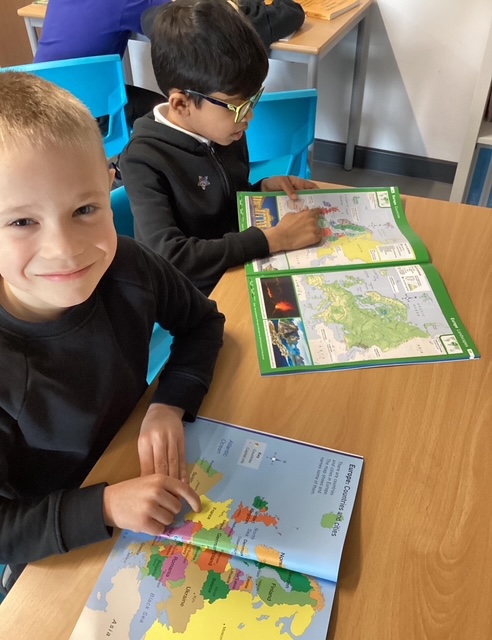Geography
“The study of Geography is about more than just memorising places on a map. It’s about understanding the complexity of our world, appreciating the diversity of cultures that exists across continents. And in the end, it’s about using that knowledge to help bridge divides and bring people together.”
Barack Obama
Intent
At Manor Drive Primary Academy, we encourage children to be curious about the world we live in and explore the topics that encompass the national curriculum. Pupils will obtain a deep knowledge about human and physical aspects of the world.
Our aim is that, through the teaching of Geography at Manor Drive Primary School, we provide a purposeful platform for exploring, appreciating and understanding the world in which we live and how it has evolved.
-
We encourage pupils to be curious and ask questions.
-
Pupils will develop an understanding of investigative concepts, knowledge and skills.
-
Pupils will become passionate and knowledgeable about our local community and beyond, by learning through experiences in practical and fieldwork activities.
-
Pupils will explore the relationship between the Earth and its people through the study of place, space and environment.
-
Pupils will explore their interest and understanding of diverse places, people, resources and natural and human environments, together with a deep understanding of the Earth's key physical and human processes.
Implementation
To implement our Geography curriculum, we will provide a variety of resources and learning experiences that cater to different learning styles. Topics are blocked to allow children to focus on developing their knowledge and skills, studying each topic in depth. CUSP is used across school to ensure lessons are structured and taught chronologically. Children start with ‘themselves’ and their local area before working out to the UK and the rest of the world. Location knowledge and map work are woven throughout all Geography topics. Our skills progression each year enables pupils to consistently build on and develop their knowledge and skills. Throughout the scheme of learning we will revisit prior learning to ensure it is embedded and complete cumulative quizzes to increase retention of key knowledge. Cross-curricular links are also made to other subjects such as maths, literacy, and ICT.
Key features of our implementation include:
-
Fieldwork: Geography is, by nature, an investigative subject which develops an understanding of concepts, knowledge and skills. We are therefore passionate about implementing our curriculum through an explorative, outdoor learning approach. We want our children to learn through hands-on experiences and investigations of physical and human geography in the local environment as far as possible, while embedding key substantive knowledge. We deliberately plan for fieldwork to occur in and around our local environment.
-
Coverage: The implementation of our curriculum ensures balanced coverage of the four main themes outlined in the National Curriculum: Geographic and skills fieldwork; locational knowledge; human and physical; and place knowledge. CUSP Geography ensures accessibility for all learners by providing differentiated resources and activities that cater to varying needs and abilities. For pupils requiring additional support, interventions and scaffolds are put in place to close learning gaps, while higher-attaining pupils are challenged to extend their understanding through problem-solving and independent research tasks.
-
Vocabulary: Vocabulary forms a key part of our curriculum. Therefore, subject-specific words are identified in each module. Supporting pupils in the acquisition of knowledge, through the use of key concepts, terms, and vocabulary, provides opportunities to build a shared and consistent understanding. Glossaries and displays, along with regular recall and revision, will be used to support this approach.
-
Early Years Foundation Stage (EYFS): Children learn about human features, including cities, towns and villages and relate them to their own location. They will make observations and draw pictures of animals and plants. They will learn about the seasons and the changes in the natural world. Children learn about weather conditions and how it affects what people wear.
Assessment
To ensure progression, our teachers systematically identify and address misconceptions while ensuring that pupils meet key milestones in their learning journey. Knowledge organisers and retrieval tasks are embedded throughout to reinforce long-term memory and build cultural capital.
Impact
The impact of this curriculum design will lead to outstanding progress over time across key stages relative to a child’s individual starting point and their progression of skills.
-
They will be able to develop ideas based on knowledge and data and share their opinions with others. Use knowledge and data to understand how the world has changed and is likely to in the future.
-
Be courageous advocates for sustainability goals
-
Gather knowledge and understanding of cultures and events from around the globe.
-
Be aware of the wider world and their place in it.
-
Interpret a range of sources of geographical information, such as maps, photographs and geographical diagrams.
-
Feel a sense of awe and wonder at the world around us.
-
Take learning into the real world; use fieldwork to make links and ask questions about the world around us and experience and observe human and physical geographical features first-hand.


